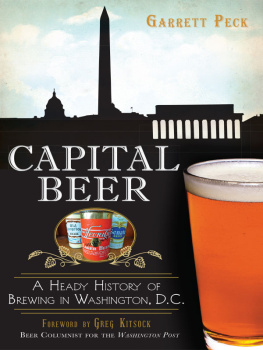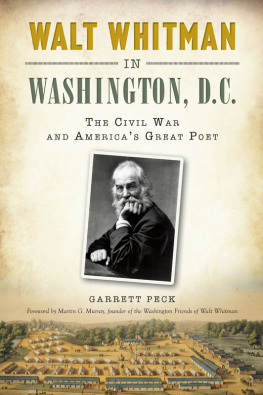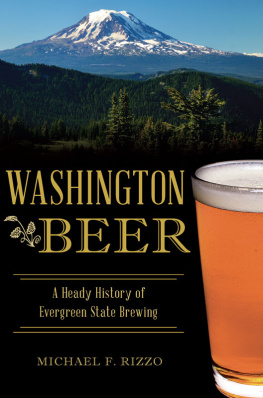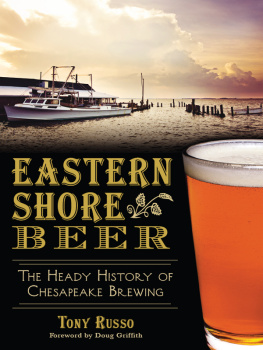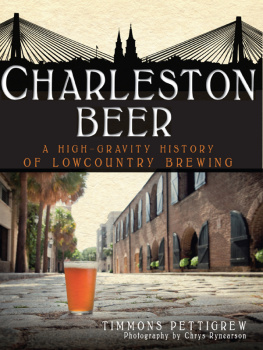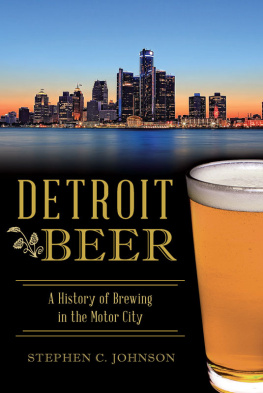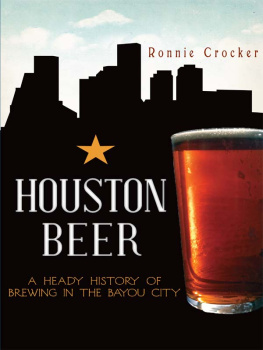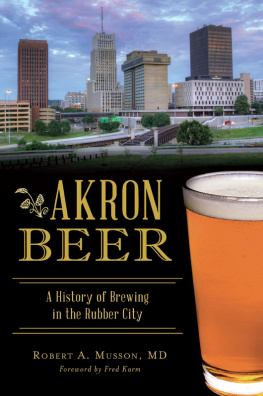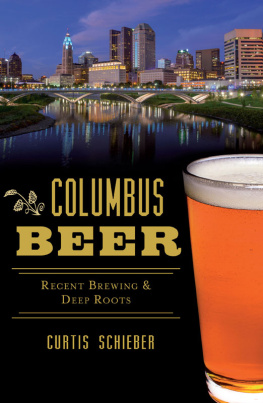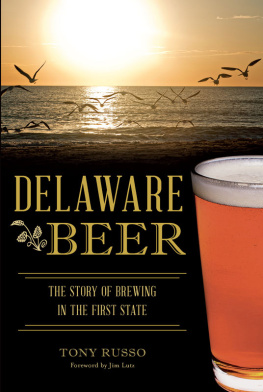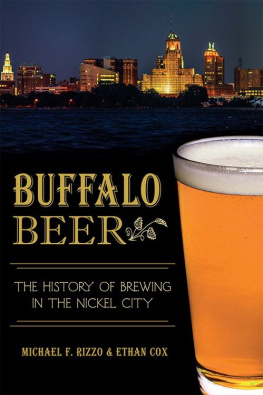
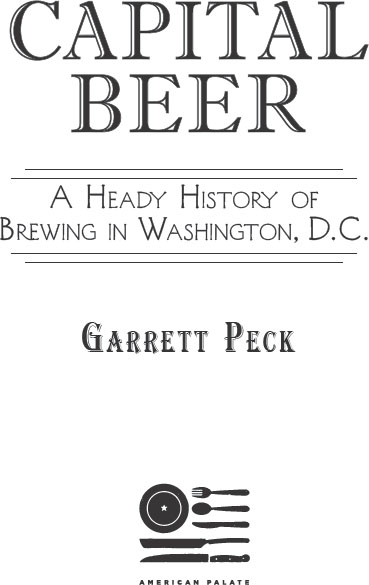
Published by American Palate
A Division of The History Press
Charleston, SC 29403
www.historypress.net
Copyright 2014 by Garrett Peck
All rights reserved
First published 2014
e-book edition 2014
ISBN 978.1.62584.974.8
Library of Congress Cataloging-in-Publication Data
Peck, Garrett.
Capital beer : a heady history of brewing in Washington, D.C. / Garrett Peck.
pages cm
Includes bibliographical references and index.
print edition ISBN 978-1-62619-441-0
1. Breweries--Washington, (D.C.)--History. 2. Beer--Washington, (D.C.)--Utica--History. 3. Washington, (D.C.)--History. I. Title.
TP577.P44 2014
338.476634209753--dc23
2014001902
Notice: The information in this book is true and complete to the best of our knowledge. It is offered without guarantee on the part of the author or The History Press. The author and The History Press disclaim all liability in connection with the use of this book.
All rights reserved. No part of this book may be reproduced or transmitted in any form whatsoever without prior written permission from the publisher except in the case of brief quotations embodied in critical articles and reviews.
ALSO BY GARRETT PECK:
The Potomac River: A History and Guide
The Prohibition Hangover: Alcohol in America from Demon Rum to Cult Cabernet
Prohibition in Washington, D.C.: How Dry We Werent
The Smithsonian Castle and the Seneca Quarry
Dedicated to Jan EvansChristian Heurichs granddaughter and a guiding force in creating the Heurich House Museum.

Jan Evans. Photo by Garrett Peck.
CONTENTS
FOREWORD
What cities come to mind when you hear the word beer? A generation ago, St. Louis and Milwaukee would have been the obvious answers. Todays craft beer enthusiasts, more mindful of quality than quantity, might cite San Diego or Seattle or Portland, Oregon. Few would place Washington, D.C., on their short lists. The District of Columbia, to many, is a symbol of bureaucratic inertia. They find it hard to believe that anybody has actually made anything here. And yet before it had a White House or Smithsonian, before it had a mile of paved road or a population equal to modern-day Podunk or Peoria, our nations capital had a brewery.
In 1796, Cornelius Coningham unpacked his brewers tools in a modest stone building a short distance from the Potomac, near where modern-day tourists toss dimes and quarters into the Reflecting Pool on the Mall. He made table beer, ale and porter for his customers in the Federal District until
Well, keep reading Garrett Pecks Capital Beer to find out the fate of the citys first brewery, as well as the source of Washingtons first lager beer. I always thought George Juenemann brewed the first German-style, bottom-fermented brew in 1856. But Pecks detective work provides compelling evidence that Washingtonians were quaffing lager a year earlier. In 1856, a Captain Bell was murdered at Beckerts Park on Capitol Hill, a beer garden and microbrewery. At the trial, one witness testified that a suspect flung a glass of lager at owner George Beckert. Because lager requires prolonged aging, Beckert must have brewed it the previous year.
Peck traces the history of brewing in D.C. from a cottage industry to a big business dominated by local beer barons. Youll meet Robert Portner of Alexandria, who helped revolutionize brewing with his advances in artificial refrigeration. His Manassas, Virginia mansion was the first home in the country to have air conditioning. Youll get to know the remarkable Christian Heurich, who, fortified by his Senate Beer and Ale, lived long enough to marry his first wifes niece and celebrate his own personal centennial in 1942.
Peck knows where the bodies are buriedliterally, he does. He lists the cemeteries where the citys brewing luminaries lie in repose, just in case you Washington beer buffs want to honor your homies by pouring a nice pilsner or pale ale on their final resting places.
But D.C.s best days as a brewing center are ahead of it, not behind it. Peck carries the story into the twenty-first century as a cadre of microbrewers return brewing to its artisanal roots. As of this writing, there are nine breweries in the city proper, and many more in the Maryland and Virginia suburbs. Still more are on the way.
Settle back with a local brewa piquant double IPA from DC Brau maybe, a chewy porter from Port City Brewing in Alexandria or Chocolate City Beers tribute to former mayor Marion Barry: an imperial stout brewed with marionberries (a type of blackberry). Youve got a good read ahead of you.
GREG KITSOCK
Beer columnist for the Washington Post
Editor of Mid-Atlantic Brewing News
ACKNOWLEDGEMENTS
The brewing community in Washington, D.C., is burgeoning, and I am grateful to the many people who contributed their stories and helped further my research. Capital Beer covers more than 240 years of brewing history, predating the founding of the nations capital. Much of the information youll find in this book comes from archival materials, interviews and personal collections.
Few people ever realize the near-super powers that archivists, curators and librarians have. They walk among us, and yet you would never guess how valuable a resource they are (they really ought to be issued capes). As with Prohibition in Washington, D.C., I am deep in gratitude for the work of Cindy Janke, an archivist at the Historical Society of Washington, D.C., whose work helped identify the early breweries and who is an encyclopedia of Capitol Hills brewing history.
The Heurich House Museum has become the go-to resource for Washingtons brewing legacy. Executive director Kimberly Bender and her amazing staffincluding curator Yana Myaskovskaya, archivist Erika Goergen and assistant director Rachel Jeromeopened the museums doors and archives to me. Christian Heurichs granddaughter Jan Evans provided a wealth of family history and personal perspective to this narrative. She has well earned this books dedication for her decades of local history support.
The staff of the Historical Society of Washington, D.C., was incredibly helpful, but I have to single out Laura Barry for scanning a treasure-trove of brewing-related images. The other major archival center for Washington history is the Washingtoniana room at the D.C. Public Library. Special collections librarian Jerry McCoy helped me find historic brewery locations and proudly displayed his vintage Alhambra beer stein (youll see it in the color insert), while Derek Gray and Mark Greek found historic images of the Heurich brewerys demolition.
Leave no stone unturned when doing research, I like to say. Sylvia Augusteijn and Jennifer King of the Special Collections Research Center at the George Washington Universitys Gelman Library opened their extensive collection of historic maps and helped me find maps of historic brewing locations and pinpoint the site of the Washington Brewery near the Navy Yard.
George Combs of the Alexandria Library helped identify historic brewery locations and was a wonderful sounding board for Alexandrias brewing history. Don Dahmann of the Old Presbyterian Meeting House identified the burial location of Alexandrias first brewer, Andrew Wales. Mary Helen Dellinger of the Manassas Museum opened her archives of Robert Portner and his family.
Next page
